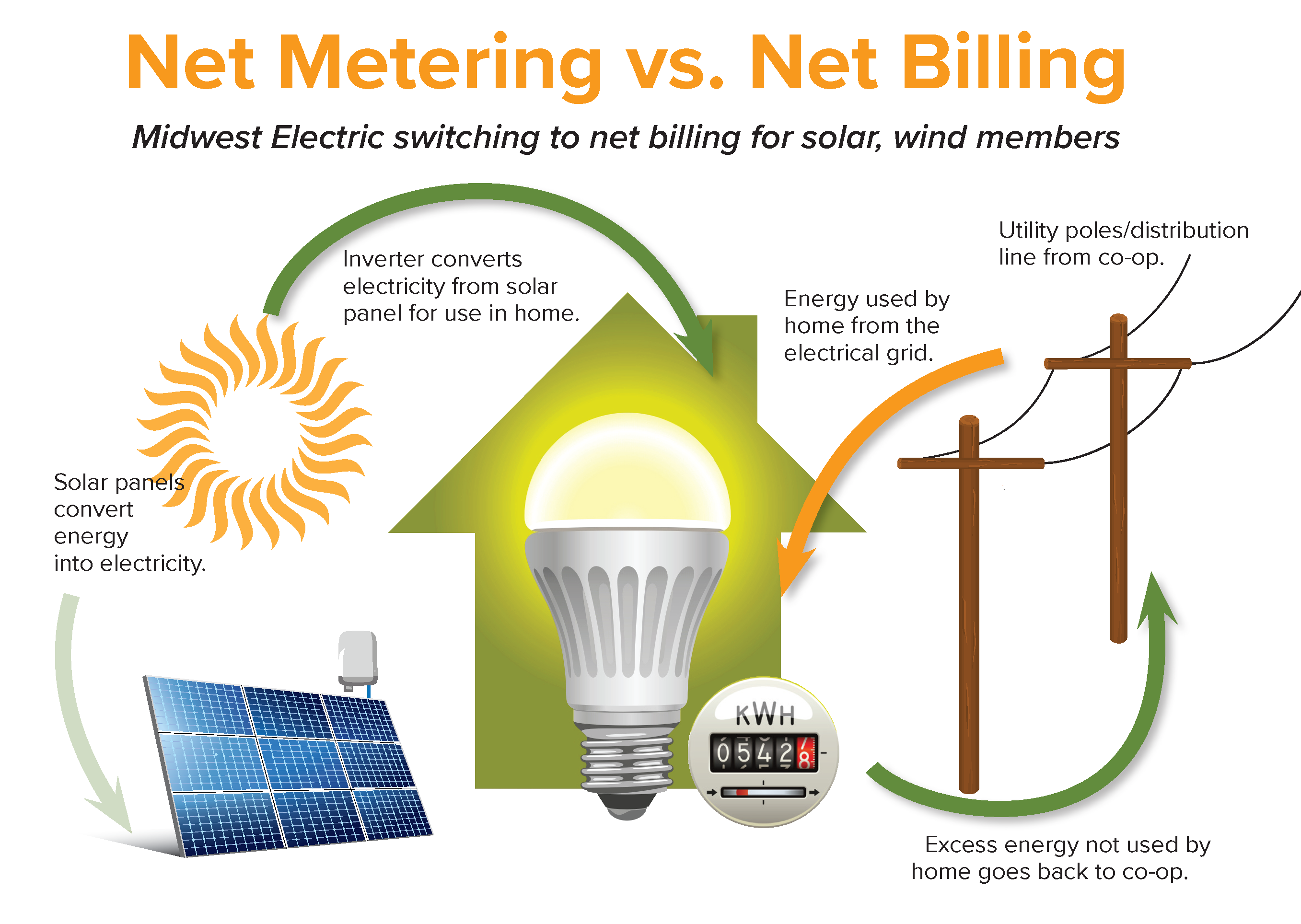Renewable Energy
We take a balanced approach to renewable energy and are committed to providing members with the best information on the subject
Considering installing solar?
If you’d like to install a solar generation system on your property, our team will walk you through the process. We do not sell renewable systems, but we can point you in the correct direction.
It's important to note that renewable systems involve a significant initial investment and vary greatly depending on the system you choose and your home's setup. The first step is always to conduct an energy audit to make sure your home is as energy efficient as possible. You want to reduce your usage first to make sure you can install the smallest system possible to meet your generation needs, without oversizing and overpaying. This will reduce the size requirements of the solar equipment.
Energy efficiency upgrades, such as adding insulation or changing out lightbulbs to LEDs, often have a much faster payback than installing solar equipment. Learn more about energy audits here and schedule an appointment.
*Visit our special solar 101 website here for video resources to help you if you're considering solar.
How it Works
Your equipment must be supplied under an equipment purchase or lease agreement (not an agreement to purchase electricity from the solar vendor). It's essential to contact us early and review the cooperative's distribution generation policies prior to starting any solar installation to avoid costly mistakes.
*Please review our policies and attached paperwork at the bottom of this page under "Connecting Your Renewable Energy to Our Electric System."
How You’re Billed
Most members with solar or wind systems still purchase energy from us each month. But if you generate more electricity than you consume, you can sell it to us at retail prices. This is done by installing a meter that records how much energy you generate onto the grid.
Tax Credits for Installations
While installation can be expensive, tax credits can help you reduce the cost of your wind or solar system.
In August 2022, Congress passed an extension of the ITC, raising it to 30% for the installation of which was between 2022-2032. (Systems installed on or before December 31, 2019 were also eligible for a 30% tax credit.) It will decrease to 26% for systems installed in 2033 and to 22% for systems installed in 2034. The tax credit expires starting in 2035 unless Congress renews it. There is no maximum amount that can be claimed.
If you opt for a solar equipment lease, consider that you will not be eligible for this tax benefit, since you will not own the solar energy system. However, you will want to explore whether you get all or part of this tax benefit applied to your base rate. You can search for additional state, local, or utility incentives on the Database of State Incentives for Renewables and Efficiency (DSIRE).
Additional Resources
Thank you for your interest in our renewable energy program. For more information or to get started, please call 1-800-962-3830 or email info@midwestrec.com.
Solar 101 Website with Video Resources
10 Steps to Take Before Installing Solar
Questions to Ask a Solar Contractor
OurSolar Community Array
Midwest Electric has a 50kW solar array next to our Amanda substation, at Fort Amanda and Bowsher roads west of Lima. It’s part of the Ohio’s Electric Cooperatives' OurSolar program, which features 2.1 mW of solar arrays throughout Ohio.
We know members wanted solar, but didn't necessary want the high costs and heavy maintenance associated with owning their own arrays. The answer? OurSolar - the best of both worlds.
Click here for more information on OurSolar and to view live production data.
Midwest Electric members or others who desire to have a windmill, solar panel, or other type of power generator that is connected to our electric system should first read and complete these three documents. Please note that our distributed generation rate is subject to change at any time.
 Co-op Member-Generated Power
Co-op Member-Generated Power
As member-owned distributed generation has evolved, so has your electric cooperative’s incorporation of member-produced energy incentives to your monthly rates.
Net metering—the procedure that allows co-op consumer-members to “bank” surplus member-generated energy in the electric grid for future use (credit) at its retail cost—has given way to net billing.
Net billing—in which member-generated power injected to the electric grid is priced at the wholesale value of the energy received from the member—has become the accepted practice among member-owned, not-for-profit electric cooperatives.
Net Metering vs. Net Billing
The topic of net metering versus net billing centers on the appropriate value for excess energy that’s sent to the cooperative when member generation produces more power than can be used at your home or business at the time of generation. Because our cooperative’s retail energy rate includes the costs of maintaining our poles and wires, as well as staffing costs, our retail energy rate is much greater than the value we receive from excess generation; in other words, our fixed costs, which aren’t reduced by excess generation. Net billing allows co-ops a more equitable balance of power generation cost and electric distribution expense.
Under net metering, your co-op pays more for distributed generation that its actual worth to the cooperative. Because co-ops are member owned, the net metering model means that those surplus costs are passed along to the rest of the membership. With net billing, the co-op pays the same amount for distributed generation as it pays for electricity generated by other sources—a fair price for all members.
Why the Change to Net Billing?
Electric cooperatives are member-owned and governed, not-for-profit organizations, based on guiding principles:
- Open and voluntary membership
- Democratic member control
- Members’ economic participation: Members contribute equitably to, and democratically control, the capital of their cooperative. At least part of that capital remains the common property of the cooperative. Members allocate surpluses for any or all of the following purposes: developing the cooperative; setting up reserves; benefiting members in proportion to their transactions with the cooperative; and supporting other activities approved by the membership.
- Autonomy and independence
- Educations, training, and information
- Cooperation among cooperatives
- Concern for community
In deference to Principle 3, electric cooperatives are obligated to operate evenly and proportionately to benefit its members fairly. While policies vary per co-op, the decision to convert to net billing is in accordance with cooperative principles.
If you are interested in installing a renewable or solar system at your location, please contact us first to review restrictions and ensure your energy use is already as efficient as possible to avoid having to pay more for an oversized system.
Have questions? Give us a call at 1-800-962-3830.
*Click here to see this information as a PDF, which appeared in Midwest's February 2021 member magazine, Ohio Cooperative Living.

Did you know a part of your power is generated from anaerobic digesters at livestock farms, gas generation from landfills, solar arrays, and hydro and wind power? We are committed to safe, reliable, affordable, and economically sustainable power production that is also environmentally responsible.
Ohio’s co-ops take a balanced approach to renewable energy. While we continue to support and utilize affordable coal-fired generation for the bulk of our power, Buckeye Power and its member cooperatives have made significant investments in renewable energy on behalf of Ohio co-op families.
EnviroWatts is a renewable energy program that gives Midwest Electric members the opportunity to support renewable energy for as little as $1 a month.
Ohio’s electric co-ops purchase their electricity from Buckeye Power. Renewable energy credits (RECs) for EnviroWatts come from Buckeye Power’s portfolio of renewable energy resources.
Buckeye Power’s portfolio includes a purchased power agreement for 30 megawatts (MW) of wind generation from an Iowa wind farm. It also encompassed three anaerobic biodigesters at a Williams County dairy, Mercer County poultry farm and a Morrow County hog farm. Combined, more than 3 MW of green power can be produced from the methane in the animal waste. Methane from landfills in Hancock and Perry Counties produce up to 9.6 MW of electricity. Buckeye Power also has a 55 MW entitlement from the New York Power Authority for hydropower from the Niagara and St. Lawrence Rivers.
EnviroWatts is sold in 100-kilowatt hour blocks, and is available to both residential and business members of the cooperative. Buying just one block of EnviroWatts each month for a year has the environmental impact of not driving your car for three months or not using 2½ barrels of oil.
EnviroWatts is optional and appears as a separate line item on the bill. Pricing for EnviroWatts is as follows:
- 1 to 25 blocks: $2 per block per month
- 26 to 250 blocks: $1.50 per block per month
- 251 blocks or more: $1 per block per month
Each block represents 100 kilowatt hours (kWh). This program works regardless of how many kWh you actually use each month. For example, you could buy just one block even if you use, for example, 800 kWh each month. You’ll pay your normal costs for electricity, plus $2.
Participants do not have renewable energy delivered directly to their home or business. Rather, it is generated and delivered to the Ohio power grid.
To sign up, call us at 1-800-962-3830 or e-mail us at info@midwestrec.com.
To run calculations to get a rough estimate of the amount of electricity you could produce with solar or wind at your location, try these websites:
Want to know whether a wind turbine might be right for you? Check out our Small Wind Guide for helpful information.
Here are two other helpful wind energy documents:
For information on residential solar power, check this out:
For information on solar power for your business, read here:
- A Rational Look at Renewable Energy: The Implications of Intermittent Power
- Germans debate cost of going green (May 2011 Financial Times newspaper)

